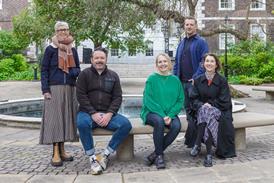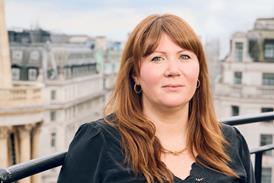
Total production funding from the British Film Institute (BFI) fell by £4m to £12.9m between April 2018-March 2019, compared to £16.9m the year before, according to figures published by the organisation.
The number of productions backed decreased to 19 in the same period, down from 26 in 2017-2018. However, the average individual production funding award increased to £750,000 from £651,000 the year before.
The full list of recipients and the amount they received is below.
A BFI spokesperson said the decrease in the total amount awarded to production year-on-year was due to normal fluctuations and was not indicative of any changes in the amount of money available. As part of the organisation’s BFI2022 plan, which covers five years from 2017 to 2022, the BFI committed to investing £79.5m through the production fund, equating to an average of £15.9m per annum.
”Our priority is not getting a fixed amount of money out the door within a certain timeframe but to back the talent and projects we believe in,” said the spokesperson. “As a result there are different levels of funding year-on-year where we may carry forward budget into the next financial year or vice versa.”
Additionally, the figures did not include documentary production funding, which was entirely transferred over to the separate BFI Doc Society Fund for the period. It had invested £1.6m in seven documentaries in 2017-18.
The exception was Scheme Birds which received £50,000 directly from the production fund in 2018-19, as the fund had backed the feature documentary with the same amount in 2017-18 and said it wanted to ensure continuity.
Furthermore, the figures do not include development awards to UK features, or any other funding activity such as training and outreach.
Debut filmmakers rise
The number of debut filmmakers supported by the BFI at production stage doubled to 10 in 2018-19 from five the previous year. Four second-time filmmakers received backing in 2018-19, down from six in 2017-18. The three largest individual awards went to Francis Lee’s Ammonite (See-Saw Productions), Sally Potter’s Molly (Adventure Pictures), and Philippa Lowthorpe’s Misbehaviour (Left Bank Pictures).
The average production budget of the19 features was £3.3m and the BFI’s average investment was £750,000. On average the BFI amount accounted for 22% of a production’s total budget. In 2017-18 the average production budget of the 26 features was £2.4m and the BFI’s average investment was £651,000, accounting for on average 31% of the total budget.
The 10 debut filmmakers received £6.3m across their projects, an average of £633,963 per film.
Additionally, the BFI provided a total £654,629 in small amounts of top-up funding to previously-backed productions including William McGregor’s Gwen (£37,000), Chiwetel Ejiofor’s The Boy Who Harnessed The Wind (£20,000), and Pawel Pawlikowski’s Cold War (£40,000) in 2018-19.
Diversity data
The number of female writers and directors supported by the BFI increased in 2018-2019, although the total number of female producers to receive production funding was down. In 2018-19, 53% of directors supported identified as female, while the figure also stood at 53% for producers and 47% for writers. In comparison with 2017-18, the female directors and writers figures were both up from 39% and 41% respectively, while producers was down from 71%.
The percentage of LGBTQ+ fundees increased across the board year-on-year. A total of 37% of directors, 21% of producers and 26% of writers identified as LGBTQ+ in 2018-19. This compares to 21% (directors), 19% (producers), and 20% (writers) in 2017-18.
The number of awardees from ’underrepresented ethnicities’ accounted for 21% of the total for both directors and writers separately in 2018-19. The percentage of directors was significantly up from 11% but the number of writers fell slightly from 23% in 2017-18. However, the number of producers from ’underrepresented ethnicities’ accounted for just 5% of the total number of supported producers, down from 11% in 2017-18.
Writers who identified as disabled received 5% of the total production funding in 2018-19, up from 4% the year before. However, no producers or directors who identified as disabled received production funding for the second year in a row.
This is the first year the BFI has published the diversity data for its production funding and the organisation has said it will do so annually from now on. Although applicants are not obliged to disclose the information, the BFI encourages everyone to complete a diversity monitoring form and it is from this that its diversity statistics have been compiled. Projects are required to meet the BFI’s Diversity Standards in order to receive production funding but these can be achieved through various criteria.
Furthermore, the BFI has now started collecting socio-economic data from its funding recipients for the year 2019-20 and in the future will publish that as part of the disclosure of diversity information.
“Socioeconomic background remains a barrier to entry in the industry. A target for filmmakers from working-class backgrounds will be set once we have collected sufficient data from current applicants, through measurements that we set last year,” said Ben Roberts, deputy CEO of the BFI who oversees the BFI Film Fund in a statement.
On the wider data, Roberts said while the BFI had “reached or exceeded our targets in a number of areas”, there were still “areas of underrepresentation that need the industry’s attention”.
In particular, Roberts highlighted “[the] need to increase the number of successful BAME producers, the number of BAME women in top creative roles and the number of filmmakers with disabilities”.
He added the organisation has “formed an Advisory Board made up of disabled talent in front of and behind the camera who are helping us to better support disabled filmmakers”.
Doc funding
One of the key differences in the year-on-year funding was the introduction of the BFI Doc Society Fund, which saw documentary body Doc Society (formerly BRITDOC) take over all of the BFI Film Fund’s documentary funding activity for 2018-19.
Doc Society was awarded £1m in that period to fund 18 documentary features, while further money was provided to support overheads and various documentary-supporting initiatives such as training and outreach, plus £112,500 to fund short films.
In total, Doc Society received £1.8m to cover a period of 18 months, with £1m earmarked to support feature production.
BFI production fund awards for 18-19:
After Love (£645,000)
Dir-scr: Aleem Khan
Prod: Matthieu de Braconier
Ammonite (£1,360,000)
Dir-scr: Francis Lee
Prods: Iain Canning, Fodhla Cronin O’Reilly
Censor (£720,000)
Dir-scr: Prano Bailey-Bond
Scr: Anthony Fletcher
Prod: Helen Jones
Herself (fka Owned) (£545,000)
Dir: Phyllida Lloyd
Scr: Clare Dunne, Malcolm Campbell
Prods: Rory Gilmartin, Ed Guiney, Sharon Horgan
Limbo (£500,000)
Dir-scr: Ben Sharrock
Prods: Irune Gurtubai, Angus Lamont
Little Joe (£500,000)
Dir-scr: Jessica Hausner
Scr: Geraldine Bajard
Prods: Bertrand Faivre, Gerardine O’Flynn, Bruno Wagner, Martin Gschlacht, Jessica Hausner, Philippe Bober
Lynn + Lucy (£560,000)
Dir-scr: Fyzal Boulifa
Prod: Camilla Bray
Misbehaviour (£1,065,080)
Dir: Philippa Lowthorpe
Scr: Gaby Chiappe, Rebecca Frayn
Prods: Suzanne Mackie, Sarah Wheale
Molly (£1,140,000)
Dir-scr: Sally Potter
Prod: Christopher Sheppard
Saint Maud (£745,320)
Dir-scr: Rose Glass
Prods: Andrea Cornwell, Oliver Kassman
Scheme Birds (doc) (£50,000)
Dir-scr: Ellen Fiske, Ellinor Hallin
Prods: Ruth Reid, Mario Adamson
Sorry We Missed You (£200,000)
Dir. Ken Loach
Scr: Paul Laverty
Prod: Rebecca O’Brien
Summerland (£899,307)
Dir-scr: Jessica Swale
Prods: Guy Heeley, Adrian Sturges
Surge (£840,000)
Dir: Aneil Karia
Scr: Aneil Karia, Rita Kalnejais, Rupert Jones
Prods: Julia Godzinskaya, Sophie Vickers
The Last Tree (£794,000)
Dir-scr: Shola Amoo
Prods Myf Hopkins, Lee Thomas
The Power (£785,000)
Dir-scr: Corinna Faith
Prods: Rob Watson, Matthew Wilkinson
The Show (£960,000)
Dir. Mitch Jenkins
Scr: Alan Moore
Prods: Mike Elliott, Jim Mooney, Tom Brown
Two For Joy (completion) (£135,000)
Dir-scr: Tom Beard
Prods: Emma Comley, Sadie Frost
Untitled Girls Film (£996,948)
Dir: Sarah Gavron
Scr: Theresa Ikoko, Claire Wilson
Prods: Faye Ward, Ameenah Ayub Allen

























1 Readers' comment